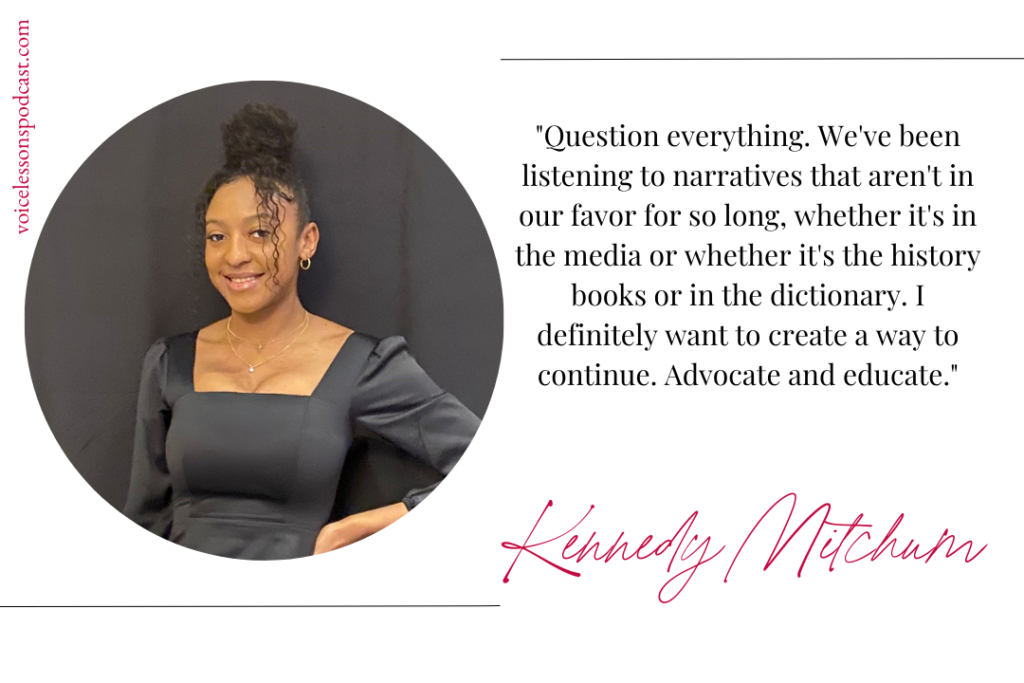A Lesson On Racism with Kennedy Mitchum
After the murder of George Floyd, Kennedy Mitchum found herself locked in battles on social media about race in America. Tired of people using the dictionary definition of racism in their defense, she contacted the editors at Merriam-Webster to argue that the entry for racism should be revised and better reflect how systemic racism is in society.
After the murder of George Floyd, Kennedy Mitchum found herself locked in battles on social media about race in America. Tired of people using the dictionary definition of racism in their defense, she contacted the editors at Merriam-Webster to argue that the entry for racism should be revised and better reflect how systemic racism is in society. In this, “Lesson On Racism”, you will find out their answer and why Kennedy believes now is the time for women to be brave.
 LISTEN: APPLE PODCASTS | STITCHER | SPOTIFY
LISTEN: APPLE PODCASTS | STITCHER | SPOTIFYTOPICS DISCUSSED IN THIS EPISODE:
- Black history in our education systems is not prevalent enough
- How Kennedy’s own personal experiences as a black woman have motivated her to push for a greater understanding of what racism means
- The incident that prompted Kennedy to reach out to Webster to change the definition of racism
- The old definition of racism does not include systemic oppression and factors that are missing
- Fighting for what you believe in
- What gave Kennedy the courage to reach out and what gave her the persistence to continue until they said yes
- The response Kennedy has received for making this change and the visibility she has received from it
- Culture is a container and it needs to change based on the people who are in the container with you
- Using your voice for change
- Everyone’s narrative deserves to be part of the story
- You don’t make a change unless you ask questions
- Question everything, educate yourself and keep pushing
- Helping lead women for those who can’t
#LESSONUP:
(4:05) And then combined with my own personal experiences as a black woman, being stereotyped, being looked over and things of that nature that hurt me and my mental health in college. The fact that people are understanding that a lot of these systems, whether it’s in the healthcare, whether it’s an education and things like that are it’s continued to perpetuate racism. They didn’t understand that connection. It’s not just individual bias. It’s not just disliking someone because of the color of their skin. It’s a lot deeper than that.
(7:55) I’ve had these same different conversations over and over again. And I just realized that that definition was the problem at that point. People continue to go there to justify ignorant behavior and it’s a stay stagnant.
(8:45) A lot of systemic oppression and a lot of the systemic factors that are missing from the definition. It’s very passive and it doesn’t show how active racism is in today’s society. So I emailed them and said at this point, you guys are misinforming the masses by using this definition. People continue to go to the dictionary for a more nuanced way of understanding a word. And racism is a word that you should have.
(9:55) I’m sick of you acting like you’re for diversity and inclusion, but not taking care of your people, your students of color, not caring, not doing anything if they have to drop out because they can’t can’t afford it, but you brought them here. I’m sick and tired of it. We don’t need words. We need actions. I need to see how you are actually for people of color at this point in time.
(14:55) Question everything. We’ve been listening to narratives that aren’t in our favor for so long, whether it’s in the media or whether it’s the history books o in the dictionary, I definitely want to create a way to continue. Advocate and educate.
(22:25) Keep pushing. Educate yourself. Start questioning this stuff because it’s just so programmed, just going with the status quo. I definitely understand, and I’ve definitely been there, but you just reach out and find those resources for yourself. At the end of the day, they’re comfortable in their spot. They’re comfortable with the way they are right now, but you aren’t and that’s not okay. So if you’re uncomfortable, you shouldn’t be uncomfortable. So keep pushing, keep doing, find different routes. Find ways in order to bring about the change that you need. If one isn’t working and find another one.
RESOURCES/FACTS:
PIN IT:

